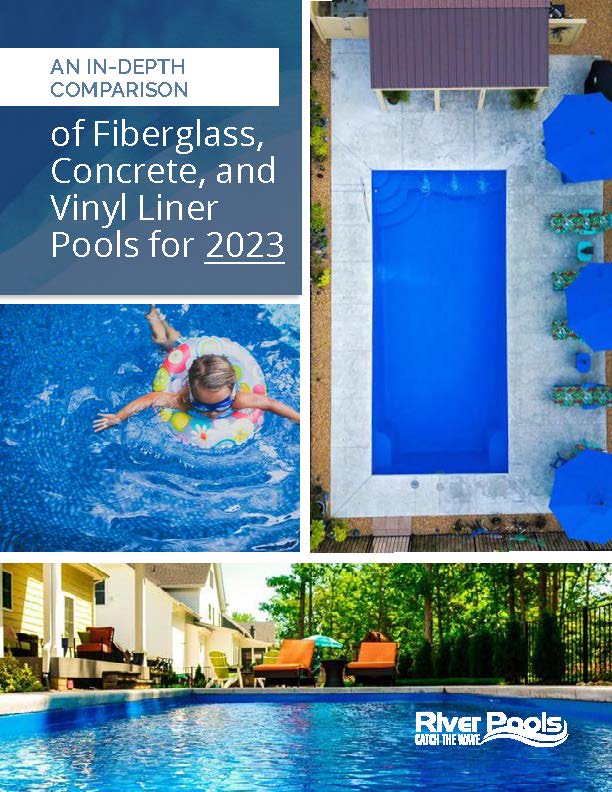River Pools & Spas Blog
The most educational swimming pool blog in the country, providing fiberglass pool articles and videos, as well as information on inground concrete and liner pools.
Let’s be honest: we all like to seem super skilled and smart. My personal tricks include: Reciting all of “Beauty and the Beast” from memory Counting on my fingers how many novels I’ve written, using dramatic pauses Using the phrase “nonlinear progression of time” (I may not be much fun at parties, now that I think about it.) Anyway, my point is, here’s a topic that you can try out for yourself: science! Science may not be your specialty, but you can impress your neighbors if you casually explain some chemistry to them in precise scientific terms, so it’s worth a shot.
Share
Cost and Pricing | Installation & Construction | Vinyl Liner Pool Information
Most of us have been around vinyl liner pools at one time or another. (For example, my grandparents have one. I now know that they needed to replace the liner years ago. Don't blame the grandkids for rusted wall panels, Nana.) But personal experience doesn't necessarily mean someone knows the details. Curious about the basics? Here at River Pools, we worked exclusively with them for years before we discovered and fell madly in love with fiberglass pools. We’re all about making information available to you and easy to understand. That includes all types of pools.
Share

Don't blindly wonder if a fiberglass, concrete, or vinyl liner pool is right for you. Our educational ebook does a deep-dive comparison of the 3 types, all while noting the advantages and disadvantages of each.
Options and Accessories | Pool Design Guides | Swimming Pool Design | Swimming Pool FAQs
For my family, a diving board is a runway. It's all very dramatic. We waddle like penguins, strut like models, wave like royalty, and stroll like oblivious pedestrians...and then drop into the deep end of the pool, still “walking.”
Share
Concrete Pool Information | Installation & Construction | Swimming Pool Design
What’s the best concrete thickness for your pool? If you’re asking this question, you’re probably already looking at and comparing the pool contractors in your area. The vast majority of us can’t DIY a concrete pool; the process is too complicated and technical. You’ll contract professionals to engineer and construct it. Be sure to ask them the relevant questions we lay out in our Swimming Pool Builder Vetting Checklist to confirm their integrity and expertise.
Share
Fiberglass Pool Information | Fiberglass Pool Manufacturers | Finding A Pool Contractor
Okay, I know warranties aren’t exactly a fun conversation topic. But bear with me! Most of us skim over Terms and Conditions, but you do actually need to read your fiberglass pool warranty—and you need to know what to look for. As fiberglass pool manufacturers and installers, we at River Pools can offer expert advice.
Share
Concrete Pool Information | Fiberglass Pool Information | Swimming Pool FAQs
Time for a radical statement: fiberglass pools aren’t for everyone.
Share
Fiberglass Pool Information | Fiberglass Pool Manufacturers | Pool Design Guides | Swimming Pool Design
Are you in the market for a freeform fiberglass pool and looking for the perfect model for your family? You aren't alone. As experts of inground fiberglass swimming pools, we at River Pools have a unique determination to help homeowners (like you!) to find your perfect pool—whether that means choosing us or not.
Share
Installation & Construction | Options and Accessories | Vinyl Liner Pool Information
As tempting as it may be sometimes, you’re not allowed to leave people stranded in your pool. There are laws against that. Swimmers need a way to get out of the water, so you need a ladder at least, if not actual steps, and you have to include them in your design from the beginning.
Share
Installation & Construction | Vinyl Liner Pool Information
Planning a new vinyl liner pool and unsure what to do with the floor? Although River Pools now specializes in fiberglass pools, we started out working only with vinyl liner pools, and we want to share our knowledge so you can make the best decision for you and your family.
Share
Concrete Pool Information | Fiberglass vs Concrete vs Vinyl Liner | Installation & Construction
If you’re planning to buy a concrete pool, have you ever wished you could time-travel to the future and see what the construction process is like? Time travel is, of course, the best solution to any question, but in this case we can provide answers without it.
Share